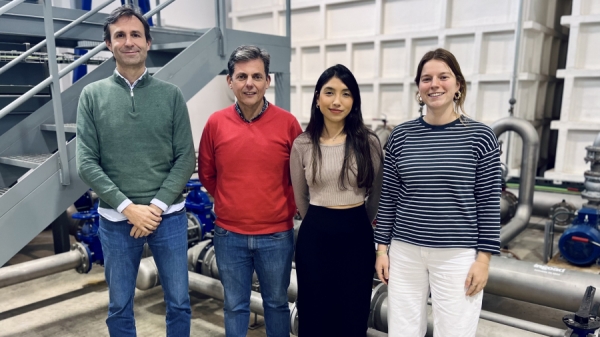In today’s geopolitical climate, energy sovereignty is a priority for large-scale facilities, which could significantly reduce costs by isolating themselves from fluctuations in the energy market and ensuring stable prices in the medium and long term.
Moreover, Europe needs to accelerate the use of renewable energy sources to meet the objectives of the Green Deal and reduce air pollution and greenhouse gas emissions.
With this in mind, the European consortium behind the HY4RES project (Hybrid Solutions for Renewable Energy Systems) is developing solutions to help agricultural operations, fish farms, ports, and energy communities meet their energy needs by combining different types of renewable energy (solar, wind, and hydroelectric).
The participating entities –part of the cross-border cooperation program Interreg Atlantic Area– will launch four pilot plants in Ireland, Spain, and Portugal to test the performance of these systems under real-world conditions.
Specifically, the University of Córdoba research team involved in the project is designing a management system that uses artificial intelligence to optimize and integrate the use of two renewable energy sources – hydroelectric and photovoltaic– for agricultural operations.
This technology can predict both the renewable energy generation and the system's energy needs up to a week in advance. It then combines these forecasts to recommend the most appropriate use of available energy.
The model has been trained using local data on energy demand and production gathered directly from the facility, which is equipped with a solar power plant, multiple sensors, and a weather station—allowing for more accurate predictions than other systems.
So far, the technology will be tested in a pilot plant being installed in the Lower Guadalquivir Valley, which the team expects to complete by the end of July. This plant will combine three energy sources: photovoltaic solar, micro-hydropower, and conventional energy, aiming to provide a steady and affordable energy supply that maintains the profitability of irrigated farms.
Hydropower and Solar Energy: The Future of Autonomous, Sustainable Irrigation
Irrigation communities are among the sectors that could benefit the most from the energy independence offered by renewables, as they require large amounts of energy to operate their irrigation systems.
“They cover vast areas, sometimes with significant elevation differences. In such cases, energy consumption is very high,” explain Juan Antonio Rodríguez Díaz and Jorge García Morillo, hydraulic engineering researchers at UCO.
Furthermore, in a context of climate change, where droughts and extreme weather events are becoming more frequent, irrigation demand is expected to rise, and the carbon footprint of such systems will become increasingly relevant.
The main limitation of these types of renewable energy is their intermittency, while irrigation communities must operate 24 hours a day– including at night, when there is no solar energy. Therefore, renewables alone cannot fully meet the energy demands of these facilities, although they significantly reduce the reliance on conventional energy sources. “It’s a very important complement,” say Rodríguez and García, citing the pilot plant in the Lower Guadalquivir Valley, which irrigates around 20,000 hectares, with over 50% of its energy already coming from renewable sources.
One solution is to use batteries to store energy, but this technology is expensive. Another option, proposed by the project, is to combine different types of renewable energy, such as solar and hydroelectric.
In a previous project, REDAWN (Reducing the Energy Dependency in Atlantic Water Networks), the same research team managed to replace a typical diesel generator –usually used when the system is off-grid– with renewable energy. This was achieved by generating electricity from excess pressure in an irrigation hydrant using a pump operating in reverse, like a turbine.
With this approach, the HY4RES project aims to demonstrate that it is possible to move toward more sustainable agriculture by reducing dependence on conventional energy sources. The combination of renewable energy types could become a key tool in securing irrigation in a climate change scenario with increasing pressure on energy resources. The University of Córdoba will continue to collaborate with its European partners to bring this transition to the field.
This report is included in the activities carried out in the project "Desarrollo de redes de asesoramiento y gestión de proyectos europeos I+D+i en la UCO" with acronym "DevelOPE", within the framework of grant GPE2023-001243-P financed by MICIU/AEI/10.13039/50110001103.


